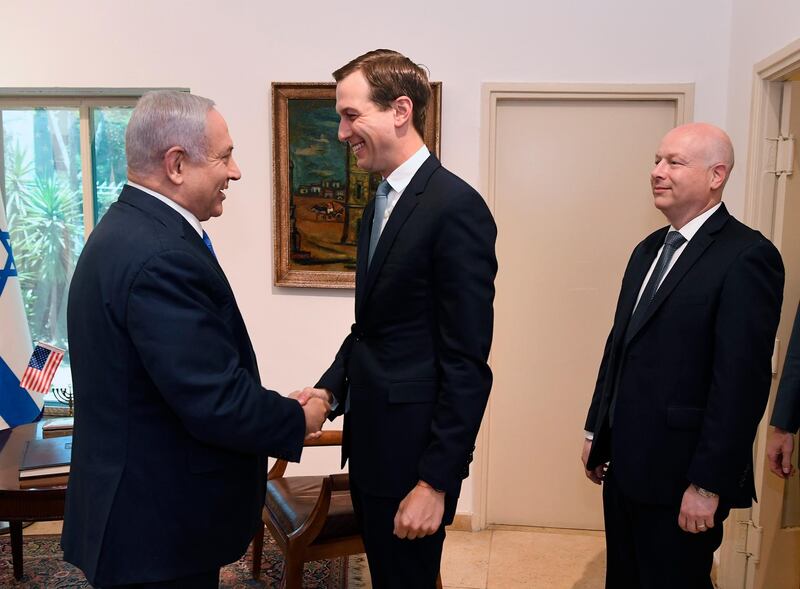A new goal appears to be emerging for the US and Israel in the Middle East: the wholesale delegitimisation of Palestinian statehood.
When the US initiated direct talks with the Palestinian Liberation Organisation in 1988, and then reinforced that step by inviting its leaders to the White House, many believed that America’s efforts to end Palestinian nationalism were over. However, the pro-Israel Trump administration has been chipping away at the idea – and, apparently, Palestinian leaders have not even noticed.
In February 2017, while serving as US ambassador to the United Nations, Nikki Haley rejected the appointment of the former Prime Minister of the Palestinian Authority, Salam Fayyad, as peace envoy to Libya. At the time, some thought that this was a one-time aberration, at least in part because President Donald Trump and his team were in active dialogue with PLO officials.
Explaining her decision, Ms Haley said: “The United States doesn’t currently support a Palestinian state or support a signal that this appointment would send to the United Nations. From now on, the United States will act, not talk, in support of our allies.”
PLO executive committee member Hanan Ashrawi described Ms Haley’s decision as ridiculous. “This is discrimination against the Palestinian people as a whole,” Mrs Ashrawi said. “This is the rejection, beyond logic, of the most qualified person with the highest standard of profession and integrity."
There was little doubt about Mr Fayyad’s suitability for the position, but the reasons for his disqualification were equally clear in the eyes of the Trump administration: his Palestinian nationalism. Mrs Ashrawi could also not have foreseen that she, herself, would also become a target of the same policy.
Last month, Mrs Ashrawi was refused a visa to visit the US. This was not an attack on her as a person, but part of a larger American fight against the very concept of Palestinian self-determination and statehood.
One need only look back at the actions of the Trump administration to confirm this.
The closure of the Palestinian mission in Washington in September 2018 and the revocation of the visa of ambassador Husam Zomlot showed that the US is no longer interested in engaging with the PLO. The defunding of the United Nations Relief and Works Agency, an organisation dedicated to the care of Palestinian refugees, revealed similar motivations. Then came Mr Trump’s unilateral decision to move the US embassy from Tel Aviv and thus take “Jerusalem off the table” as the capital of an independent Palestinian state.
A close reading of the public statements of top US officials provides further confirmation. Secretary of State Mike Pompeo's refusal to commit to the two-state solution was the first indication of a U-turn in American Middle East policy. Then Jared Kushner, the president's son-in-law and chief adviser on the Middle East, declared that the so-called US peace plan will not even refer to a two-state solution.
But perhaps the most vivid illustration of the US's concerted attempts to delegitimise Palestinian nationalism can be seen by simply analysing the Twitter account of Jason Greenblatt, Washington's point man for the Palestine-Israel conflict.
Mr Greenblatt, who describes himself as “Assistant to the 45th President of the USA & Special Representative for International Negotiations”, has more than 28,000 followers, but he only follows 20 users – mostly Trump officials. The only non-US accounts among these are Israel’s Prime Minister Benjamin Netanyahu, Israel’s Ambassador to the US Ron Dermer, and the Israeli embassy in Washington. He doesn’t follow a single Palestinian. For a person seeking solutions to the Palestinian conflict and who is familiar with all the players, it makes little sense that he appears not to want to know what people such as Palestinian President Mahmoud Abbas, Prime Minister Mohammad Shtayyeh or PLO secretary general Saeb Erekat are thinking. All have Twitter accounts and all post both in Arabic and in English.
In March and April 2019, Mr Greenblatt posted 233 times. A whopping 136 tweet (58 per cent) are directly pro-Israel and anti-Palestinian, with much of his antipathy directed towards Hamas. A further 22 deal with the US support for the Israeli annexation of the Golan Heights; 10 praise the moves of Arab leaders to normalise relations with Israel, while another seven support Mr Netanyahu’s hardline policy towards Iran. In total, 76 per cent of all the tweets by Mr Greenblatt in this two-month period are supportive of Mr Netanyahu’s policies.
The numbers alone are revealing, but the content of Mr Greenblatt’s postings paints an even more lucid picture. In a tweet dated April 23, he described a mural of one of the most revered PLO leaders Khalil Ibrahim Al Wazir as a “despicable glorification of violence and terrorism”.
None of the tweets posted in March or April have a single negative comment about Israel or its leaders. In fact, Mr Greenblatt has never criticised Israeli leaders – not even when organisations such as the American Israel Public Affairs Committee were condemning Mr Netanyahu’s pre-election alliances with extremist parties such as the settler-supporting Jewish Home and the openly racist Otzma Yehudit (Jewish Strength).
Mr Greenblatt often says that his team wants to do things differently. He has also expressed a desire not to repeat past mistakes. However, one of the greatest failures of US Middle East policy was its denial of Palestinian nationalism back in the 1970s and 1980s.
If the Trump administration wants its vision for peace between Palestine and Israel to have any credibility, it has to change its approach. A balanced public position, showing respect to aspirations of Palestinian statehood and Palestinian leaders, not to mention some expression of empathy for those experiencing the brutal realities of occupation, would be a good place to start.
Daoud Kuttab is a Palestinian journalist and media activist





